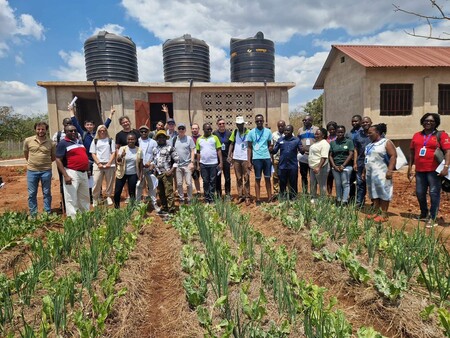
Apodissi, a small and medium-sized enterprise (SME) in Nigeria, is playing a pivotal role in the communication and dissemination of the PrAEctiCe research and innovation project.
This Horizon Europe Initiative, funded by the European Union, aims to advance sustainable agricultural practices across East Africa. By focusing on the integration of advanced technologies, the project seeks to promote agro-ecological transitions with scalable outcomes that can be replicated across Africa, including in Nigeria.
Apodissi’s general manager, Margherita Trestini emphasises the company’s commitment to connecting research and innovation across Africa, Europe and the Middle East to unlock Africa’s full potential. “The PrAEctiCe project is one of many international research and innovation initiatives we are involved in. It is particularly exciting for us because it focuses on adapting and deploying advanced technologies in Africa, fostering knowledge transfer between mature and emerging markets in the agricultural sector – a critical pillar for Nigeria’s economy and job creation. Through this project, we aim to replicate successful experiences in Nigeria.”
A key aspect of the PrAEctiCe project is the development of climate-smart agri-food systems, which are being facilitated through the creation of innovative tools and frameworks. One such tool is the state-of-the-art digital decision support tool, designed to empower smallholder farmers with actionable insights using advanced technologies like remote sensing and digital data monitoring. This tool ensures inclusivity by offering user-friendly solutions that cater to various literacy levels and technological access.
Apodissi’s role in the project is instrumental in shaping the narrative around agro-ecology as a viable solution for food security and the empowerment of farmers across Africa. This aligns with the company’s broader mission of fostering sustainable development and innovation within the continent.
The recent Agro-ecology Summit, hosted by the project partners, underscored the significant impact of the project. The summit brought together over 120 stakeholders from farming communities, leading discussions and promoting actions toward sustainable agricultural transformation. It highlighted the importance of co-creation, blending traditional knowledge with modern technological advancements to enhance local farming practices.
The summit served as a platform for dialogue on integrating technology and innovation into smallholder farming, aiming to create climate-smart agri-food systems that align with the United Nations’ Sustainable Development Goals. Participants discussed the critical role of agro-ecological aquaculture systems within Africa’s food system, addressing current challenges while exploring future opportunities.
Key discussions focused on implementing frameworks to adopt agro-ecological practices, fostering stakeholder collaboration, and empowering smallholder aquaculture producers. The event emphasised the importance of collective action in driving sustainable agricultural transformation, showcasing how technology can complement traditional practices and improve food security. The goal is to enhance the resilience of smallholder farmers across the continent.
The summit also showcased how advanced technologies like remote sensing, digital data and Geographic Information Systems (GIS) can enhance the efficiency, selection and monitoring of sustainable smallholder aquaculture operations. The emphasis was placed on integrating digitisation and innovation into agro-ecological practices.
Prof. Domen Mongus from the University of Maribor introduced the PrAEctiCe project’s flagship technology: the digital decision support tool. This tool is being developed to help smallholder farmers in East Africa transition to agro-ecology. Available as an app for both farmers and advisors, the tool prioritises quality data input and will act as a central monitoring system that processes data collected from farms and agricultural locations. The app for farmers will provide usable information, while the advisor’s app will feature advanced management tools.
A technical and commercial consultant at Aquagri, Lopo Carvalho highlighted the challenges smallholder farmers face in using sensors to collect data. To address this, a database with simple indicators will be made available for farmers to report their activities. The interactive platform will collect, process and output usable information, ensuring digital inclusion and accessibility. For stakeholders without smartphones, notifications and information will be sent via multimedia messaging services (MMS) or text messages, with access to advisors for additional guidance.
General coordinator of AFSA, Million Belay delivered a keynote address on the role of agro-ecology in sustainably enhancing productivity, food security and profitability in global food systems. “Our Kenyan partners are launching an agro-ecology policy in Kenya. Many things are happening, and the wind is shifting toward agro-ecology,” he said, optimistically highlighting the growing momentum for sustainable agricultural practices.
During the summary of breakout sessions, Nicholas Outa, a PhD scholar in Fisheries and Aquaculture at Maseno University, emphasised the importance of recognising indigenous knowledge as valuable. “This knowledge, cultivated over generations, enhances contemporary farming practices and should not be viewed as inferior,” he stated. Adu, another participant, emphasised the need for co-creation between researchers, policymakers, and indigenous farmers to achieve sustainable agricultural outcomes.
An agro-ecology specialist at Maseno University, Professor Harun Okello advocated for a shift in agricultural decision-making processes. He asserted, “We should help farmers by moving findings from the field to the table where decisions are made.” This highlights the importance of involving both male and female farmers in discussions about agricultural advancements and policies that directly affect their livelihoods.
Looking ahead, the PrAEctiCe project will host Open Days across its living labs in Kenya, Uganda, and Tanzania. These events will showcase the scalability of agro-ecological systems and their potential to optimise farming practices. For Apodissi, these events present an opportunity to gather insights and strategies that can later be applied to similar initiatives in Nigeria. This will help create a blueprint for sustainable agricultural transformation, with the knowledge and technologies developed through the project contributing to a more sustainable and food-secure future for Nigeria and beyond.
The project’s partners include Hochschule Karlsruhe University of Applied Sciences, Steinbeis Europa Zentrum, AquaBiotech, Prototipi, University of Gothenburg, Makerere University, Uganda Martyrs University, University of Maribor, Ministry of Agriculture and Livestock Development (moALD), RUFORUM, National Agriculture Research Organisation, Maseno University, Sustainable Agriculture Tanzania (SAT), Aquagri, AFSA Africa and the Africa Agribusiness Academy.


